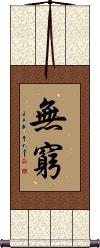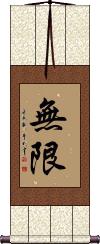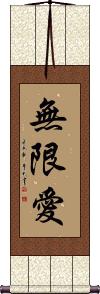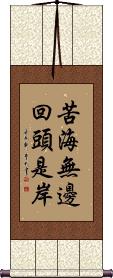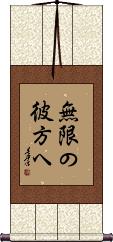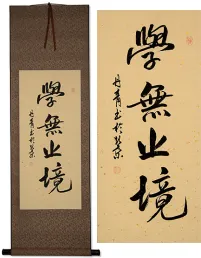Many custom options...
And formats...

Infinite in Chinese / Japanese...
Buy an Infinite calligraphy wall scroll here!
Personalize your custom “Infinite” project by clicking the button next to your favorite “Infinite” title below...
1. Infinity / Infinite / Endless / Boundless
2. Infinity / Infinite / Unlimited / Unbounded
Infinity / Infinite / Endless / Boundless
(Chinese / Korean)
無窮 is the Chinese and Korean word meaning infinity, eternity, infinitude, infinite or endless.
無窮 literally translates as “without [ever becoming] exhausted/poor,” and in that context, can mean “inexhaustible” or “boundless” but this is usually read as “without end.” Some extended definitions include eternity, infinitude, or immortality.
In certain contexts, it can mean “immortality.”
The first character means “never” or “not.” The second means “exhausted,” “finished,” or “ending.”
Note: 無窮 is a Japanese word but rarely used in modern Japan.
Infinity / Infinite / Unlimited / Unbounded
Japanese = Infinity / Chinese = No limits
無限 is the Chinese and Japanese word meaning infinity, unlimited or unbounded.
無限 literally translates as “without limits” or “without [being] bound.”
The first character means “never” or “not,” like the prefix “un-.”
The second means “limited,” “restricted,” or “bound.”
Please note that the Japanese definition leans more toward “infinity” and the Chinese is more about being “boundless” or “without limits.”
In Korean, this means infinity, infinitude, or boundlessness. But in Korean, this term has many interpretations or contexts, so your intended meaning might be vague or ambiguous.
Infinite Love
Greatest Infinite Love
In the Abyss of Infinite Bitterness - Turn to the Shore
苦海無邊, 回頭是岸 can be translated almost directly as “The sea of bitterness has no bounds, turn your head to see the shore.”
Often this proverb refers to how Buddhist enlightenment can allow one to shed off the abyss of worldly suffering. But it can apply to other religions. If you find yourself trapped in the hardship of this worldly life, take a new turn, and seek a path to salvation.
To Infinity and Beyond
To Infinity and Beyond
無限の彼方へ means “to infinity and beyond,” in Japanese.
This is how the slogan/phrase from Toy Story's Buzz Lightyear was translated from the movie into Japanese.
Note: Because this selection contains some special Japanese Hiragana characters, it should be written by a Japanese calligrapher.
This in-stock artwork might be what you are looking for, and ships right away...
Gallery Price: $100.00
Your Price: $49.88
These search terms might be related to Infinite:
A Vast Sky Full of Stars
A Wise Man Changes His Mind (But a Fool Never Will)
Better Late Than Never
Big Dream / Great Hope
Daimyo / Great Name
Door of Great Wisdom
Drinking the Water of a Well: One Should Never Forget Who Dug It
Endless / Without Limit
Extreme / Intense
Extreme Faithfulness
Grand Master / Great Teacher
Great Ambitions
Great Aspirations / Ambition
Great Britain
Great Endeavor / to Strive
Great Expectations
Great Illumination of Wisdom
Great Lord / Tycoon
Great Lotus Wisdom - Samadhi Wisdom
Great Peace
Great Power
Great Responsibility
Great Sea
Great Wisdom
Heroic Spirit / Great Ambition
I Climbed the Great Wall
Immeasurable / Unlimited
Infinity / Infinite / Endless / Boundless
Infinity / Infinite / Unlimited / Unbounded
Large River
Never Forget
Never Forget Your First Resolution
Never Give in / Never Succumb / Never Lose
Never Give Up
Never Put Off Until Tomorrow What You Can Do Today
Respect Out of Fear is Never Genuine; Reverence Out of Respect is Never False
Samsara / Endless Cycle of Rebirth
The Great Path Has No Gate
The Great Wall of China
Not the results for infinite that you were looking for?
Below are some entries from our dictionary that may match your infinite search...
| Characters If shown, 2nd row is Simp. Chinese |
Pronunciation Romanization |
Simple Dictionary Definition |
佛 see styles |
fú fu2 fu hotoke ほとけ |
More info & calligraphy: Buddhism / Buddha(surname) Hotoke Buddha, from budh to "be aware of", "conceive", "observe", "wake"; also 佛陀; 浮圖; 浮陀; 浮頭; 浮塔; 勃陀; 勃馱; 沒馱; 母馱; 母陀; 部陀; 休屠. Buddha means "completely conscious, enlightened", and came to mean the enlightener. he Chinese translation is 覺 to perceive, aware, awake; and 智 gnosis, knowledge. There is an Eternal Buddha, see e.g. the Lotus Sutra, cap. 16, and multitudes of Buddhas, but the personality of a Supreme Buddha, an Ādi-Buddha, is not defined. Buddha is in and through all things, and some schools are definitely Pan-Buddhist in the pantheistic sense. In the triratna 三寳 commonly known as 三寳佛, while Śākyamuni Buddha is the first "person" of the Trinity, his Law the second, and the Order the third, all three by some are accounted as manifestations of the All-Buddha. As Śākyamuni, the title indicates him as the last of the line of Buddhas who have appeared in this world, Maitreya is to be the next. As such he is the one who has achieved enlightenment, having discovered the essential evil of existence (some say mundane existence, others all existence), and the way of deliverance from the constant round of reincarnations; this way is through the moral life into nirvana, by means of self-abnegation, the monastic life, and meditation. By this method a Buddha, or enlightened one, himself obtains Supreme Enlightenment, or Omniscience, and according to Māhāyanism leads all beings into the same enlightenment. He sees things not as they seem in their phenomenal but in their noumenal aspects, as they really are. The term is also applied to those who understand the chain of causality (twelve nidānas) and have attained enlightenment surpassing that of the arhat. Four types of the Buddha are referred to: (1) 三藏佛the Buddha of the Tripiṭaka who attained enlightenment on the bare ground under the bodhi-tree; (2) 通佛the Buddha on the deva robe under the bodhi-tree of the seven precious things; (3) 別佛the Buddha on the great precious Lotus throne under the Lotus realm bodhi-tree; and (4) 圓佛the Buddha on the throne of Space in the realm of eternal rest and glory where he is Vairocana. The Hīnayāna only admits the existence of one Buddha at a time; Mahāyāna claims the existence of many Buddhas at one and the same time, as many Buddhas as there are Buddha-universes, which are infinite in number. |
化身 see styles |
huà shēn hua4 shen1 hua shen keshin けしん |
More info & calligraphy: Avatar(n,vs,adj-no) {Buddh} incarnation; impersonation; personification; avatar nirmāṇakāya, 應身, 應化身; 變化身 The third characteristic or power of the trikāya 三身, a Buddha's metamorphosic body, which has power to assume any shape to propagate the Truth. Some interpret the term as connoting pan-Buddha, that all nature in its infinite variety is the phenomenal 佛身 Buddha-body. A narrower interpretation is his appearance in human form expressed by 應身, while 化身 is used for his manifold other forms of appearances. |
無極 无极 see styles |
wú jí wu2 ji2 wu chi mugoku むごく |
More info & calligraphy: Wu Chi / Wuji(n,adj-na,adj-no) (1) limitless; (n,adj-na,adj-no) (2) apolar; (n,adj-na,adj-no) (3) (See 太極) limitlessness of taiji; (given name) Mugoku Limitless, infinite. |
無盡 无尽 see styles |
wú jìn wu2 jin4 wu chin mujin むじん |
More info & calligraphy: Endless / Without Limit(given name) Mujin Inexhaustible, without limit. It is a term applied by the 權教 to the noumenal or absolute; by the 實教 to the phenomenal, both being considered as infinite. The Huayan sūtra 十地品 has ten limitless things, the infinitude of living beings, of worlds, of space, of the dharmadhātu, of nirvāṇa, etc. |
無量 无量 see styles |
wú liàng wu2 liang4 wu liang muryou / muryo むりょう |
More info & calligraphy: Immeasurable / Unlimited(adj-no,n) immeasurable; infinite; inestimable; (given name) Muryō apramāṇa; amita; ananta; immeasurable, unlimited, e.g. the 'four infinite' characteristics of a bodhisattva are 慈悲喜捨 kindness, pity, joy, and self-sacrifice. |
無限 无限 see styles |
wú xiàn wu2 xian4 wu hsien mugen むげん |
More info & calligraphy: Infinity / Infinite / Unlimited / Unbounded(1) infinity; infinitude; eternity; (adj-no,adj-na) (2) infinite; limitless; (given name) Mugen infinite |
四無量心 四无量心 see styles |
sì wú liàng xīn si4 wu2 liang4 xin1 ssu wu liang hsin shi muryōshin |
More info & calligraphy: Brahmavihara - The Four Immeasurables |
澒 see styles |
hòng hong4 hung |
vast; infinite |
三堅 三坚 see styles |
sān jiān san1 jian1 san chien sanken |
The three sure or certain things are 身, 命 and 財, i.e. the reward of the true disciple is an infinite body or personality, an endless life, and boundless (spiritual) possessions, 無極之身, 無窮之命, 無盡之財, v. 能摩經:菩薩品. |
九地 see styles |
jiǔ dì jiu3 di4 chiu ti kyuuchi / kyuchi きゅうち |
very low land; (surname) Kuji The nine lands, i.e. the 欲界 realm of desire or sensuous realm the four 色界 realms of form or material forms; and the four 無色界 formless realms, or realms beyond form; v. 九有, 九有情居, 禪 and 定. The nine realms are:—(1) 欲界五趣地; the desire realm with its five gati, i.e. hells, hungry ghosts, animals, men, and devas. In the four form-realms are:— (2) 離生喜樂地 Paradise after earthly life, this is also the first dhyāna, or subject of meditation, 初禪. (3) 定生喜樂地 Paradise of cessation of rebirth, 二禪. (4) 離喜妙樂地 Land of wondrous joy after the previous joys, 三禪. (5) 捨念淸淨地 The Pure Land of abandonment of thought, or recollection (of past delights), 四禪. The four formless, or infinite realms, catur arūpa dhātu, are:—(6) 空無邊處地 ākāśānantyā-yatanam, the land of infinite space; also the first samādhi, 第一定. (7) 識無邊處地 vijñānānamtyāyatanam, the land of omniscience, or infinite perception, 二定. (8) 無所有處地 ākiñcanyāyatana, the land of nothingness, 三定. (9) 非想非非想處地 naivasaṁjñānā-saṁjñāyatana, the land (of knowledge) without thinking or not thinking, or where there is neither consciousness nor unconsciousness, i.e. above either; this is the 四定. Eitel says that in the last four, "Life lasts 20,000 great kalpas in the 1st, 40,000 in the 2nd, 60,000 in the 3rd, and 80,000 great kalpas in the 4th of these heavens." |
五因 see styles |
wǔ yīn wu3 yin1 wu yin goin |
The five causes, v. 倶舍論 7. i. e. (1) 生因 producing cause; (2) 依因supporting cause; (3) 立因 upholding or establishing cause; (4) 持因 maintaining cause; (5) 養因 nourishing or strengthening cause. These all refer to the four elements, earth, water, fire, wind, for they are the causers or producers and maintainers of the infinite forms of nature. Another list from the Nirvana-Sutra 21 is (1) 生因 cause of rebirth, i. e. previous delusion; (2) 和合因 intermingling cause, i. e. good with good, bad with bad, neutral with neutral; (3) 住因 cause of abiding in the present condition, i. e. the self in its attachments; (4) 增長因 causes of development, e. g. food, clothing, etc.; (5) 遠因 remoter cause, the parental seed. |
五觀 五观 see styles |
wǔ guān wu3 guan1 wu kuan gokan |
The five meditations referred to in the Lotus Sutra 25: (1) 眞 on the true, idem 空觀, to meditate on the reality of the void or infinite, in order to be rid of illusion in views and thoughts; (2) 淸淨觀 on purity, to be rid of any remains of impurity connected with the temporal, idem 假觀; (3) 廣大智慧觀 on the wider and greater wisdom, idem 中觀, by study of the 'middle' way; (4) 悲觀 on pitifulness, or the pitiable condition of the living, and by the above three to meditate on their salvation; (5) 慈觀 on mercy and the extension of the first three meditations to the carrying of joy to all the living. |
六瑞 see styles |
liù ruì liu4 rui4 liu jui roku sui |
The six auspicious indications attributed to the Buddha as a preliminary to his delivery of the Lotus Sutra, see 法華經, 序品: (1) his opening address on the infinite; (2) his samādhi; (3) the rain of flowers; (4) the earthquake; (5) the delight of the beholders; (6) the Buddha-ray. |
十智 see styles |
shí zhì shi2 zhi4 shih chih jū chi |
The ten forms of understanding. I. Hīnayāna: (1) 世俗智 common understanding; (2) 法智 enlightened understanding, i.e. on the Four Truths in this life; (3) 類智 ditto, applied to the two upper realms 上二界; (4), (5), (6), (7) understanding re each of the Four Truths separately, both in the upper and lower realms, e.g. 苦智; (8) 他心智 understanding of the minds of others; (9) 盡智 the understanding that puts an end to all previous faith in or for self, i.e. 自信智; (10) 無生智 nirvāṇa wisdom; v. 倶舍論 26. II. Mahāyāna. A Tathāgatas ten powers of understanding or wisdom: (1) 三世智 perfect understanding of past, present, and future; (2) ditto of Buddha Law; (3) 法界無礙智 unimpeded understanding of the whole Buddha-realm; (4) 法界無邊智 unlimited, or infinite understanding of the whole Buddha-realm; (5) 充滿一切智 understanding of ubiquity; (6) 普照一切世間智 understanding of universal enlightenment; (7) 住持一切世界智 understanding of omnipotence, or universal control; (8) 知一切衆生智 understanding of omniscience re all living beings; (9) 知一切法智 understanding of omniscience re the laws of universal salvation; (10) 知無邊諸佛智 understanding of omniscience re all Buddha wisdom. v. 華嚴経 16. There are also his ten forms of understanding of the "Five Seas" 五海 of worlds, living beings, karma, passions, and Buddhas. |
四住 see styles |
sì zhù si4 zhu4 ssu chu shizumi しずみ |
(surname) Shizumi The four abodes or states in the 智度論 3, i. e. (1) 天住 the devalokas, equivalents of charity, morality, and goodness of heart; (2) 梵住 the brahmalokas, equivalents of benevolence, pity, joy, and indifference; (3) 聖住 the abode of śrāvakas, pratyekabuddhas, and bodhisattvas, equivalent of the samādhi of the immaterial realm, formless and still; (4) 佛住 the Buddha-abode, the equivalent of the samādhis of the infinite. v. 四住地. |
四禪 四禅 see styles |
sì chán si4 chan2 ssu ch`an ssu chan shizen |
(四禪天) The four dhyāna heavens, 四靜慮 (四靜慮天), i. e. the division of the eighteen brahmalokas into four dhyānas: the disciple attains to one of these heavens according to the dhyāna he observes: (1) 初禪天 The first region, 'as large as one whole universe' comprises the three heavens, Brahma-pāriṣadya, Brahma-purohita, and Mahābrahma, 梵輔, 梵衆, and 大梵天; the inhabitants are without gustatory or olfactory organs, not needing food, but possess the other four of the six organs. (2) 二禪天 The second region, equal to 'a small chiliocosmos' 小千界, comprises the three heavens, according to Eitel, 'Parīttābha, Apramāṇābha, and Ābhāsvara, ' i. e. 少光 minor light, 無量光 infinite light, and 極光淨 utmost light purity; the inhabitants have ceased to require the five physical organs, possessing only the organ of mind. (3) 三禪天 The third region, equal to 'a middling chiliocosmos '中千界, comprises three heavens; Eitel gives them as Parīttaśubha, Apramāṇaśubha, and Śubhakṛtsna, i. e. 少淨 minor purity, 無量淨 infinite purity, and 徧淨 universal purity; the inhabitants still have the organ of mind and are receptive of great joy. (4) 四禪天 The fourth region, equal to a great chiliocosmos, 大千界, comprises the remaining nine brahmalokas, namely, Puṇyaprasava, Anabhraka, Bṛhatphala, Asañjñisattva, Avṛha, Atapa, Sudṛśa, Sudarśana, and Akaniṣṭha (Eitel). The Chinese titles are 福生 felicitous birth, 無雲 cloudless, 廣果 large fruitage, 無煩 no vexations, atapa is 無熱 no heat, sudṛśa is 善見 beautiful to see, sudarśana is 善現 beautiful appearing, two others are 色究竟 the end of form, and 無想天 the heaven above thought, but it is difficult to trace avṛha and akaniṣṭha; the inhabitants of this fourth region still have mind. The number of the dhyāna heavens differs; the Sarvāstivādins say 16, the 經 or Sutra school 17, and the Sthavirāḥ school 18. Eitel points out that the first dhyāna has one world with one moon, one mem, four continents, and six devalokas; the second dhyāna has 1, 000 times the worlds of the first; the third has 1, 000 times the worlds of the second; the fourth dhyāna has 1, 000 times those of the third. Within a kalpa of destruction 壞劫 the first is destroyed fifty-six times by fire, the second seven by water, the third once by wind, the fourth 'corresponding to a state of absolute indifference' remains 'untouched' by all the other evolutions; when 'fate (天命) comes to an end then the fourth dhyāna may come to an end too, but not sooner'. |
四等 see styles |
sì děng si4 deng3 ssu teng shitō |
The four virtues which a Buddha out of his infinite heart manifests equally to all; also called 四無量 q. w. They are: 慈悲喜捨 maitrī, karuṇā, muditā, upekṣā, i. e. kindness, pity, joy and indifference, or 護 protection. Another group is 字語法身, i. e. 字 that all Buddhas have the same title or titles; 語 speak the same language; 法 proclaim the same truth; and 身 have each the threefold body, or trikāya. A third group is 諸法 all things are equally included in the bhūtatathatā; 發心 the mind-nature being universal, its field of action is universal; 道等 the way or method is also universal; therefore 慈悲 the mercy (of the Buddhas) is universal for all. |
塵劫 尘劫 see styles |
chén jié chen2 jie2 ch`en chieh chen chieh jingō |
(塵點劫) A period of time as impossible of calculation as the atoms of a ground-up world, an attempt to define the infinite, v. Lotus Sūtra 7 and 16. |
方廣 方广 see styles |
fāng guǎng fang1 guang3 fang kuang hōkō |
vaipulya, 毘佛略 expansion, enlargement, broad, spacious. 方 is intp. by 方正 correct in doctrine and 廣 by 廣博 broad or wide; some interpret it by elaboration, or fuller explanation of the doctrine; in general it may be taken as the broad school, or wider teaching, in contrast with the narrow school, or Hīnayāna. The term covers the whole of the specifically Mahāyāna sutras. The sutras are also known as 無量義經 scriptures of measureless meaning, i. e. universalistic, or the infinite. Cf. 方等. |
有量 see styles |
yǒu liáng you3 liang2 yu liang uryō |
Limited, finite; opposite of 無量 measureless, boundless, infinite. 有相有量That which has form and measurement is called 麤 coarse, i. e. palpable, that which is without form and measurement 無相無量 is called 細 fine, i. e. impalpable. |
没底 see styles |
mò dǐ mo4 di3 mo ti mochitei |
infinite |
法相 see styles |
fǎ xiàng fa3 xiang4 fa hsiang hossou / hosso ほっそう |
(1) {Buddh} (See 法性) dharmalaksana (dharma characteristics, the specific characteristics of all manifest phenomena); (2) (abbreviation) (See 法相宗) Hosso sect of Buddhism The aspects of characteristics of things-all things are of monad nature but differ in form. A name of the 法相宗 Faxiang or Dharmalakṣaṇa sect (Jap. Hossō), called also 慈恩宗 Cien sect from the Tang temple, in which lived 窺基 Kuiji, known also as 慈恩. It "aims at discovering the ultimate entity of cosmic existence n contemplation, through investigation into the specific characteristics (the marks or criteria) of all existence, and through the realization of the fundamental nature of the soul in mystic illumination". "An inexhaustible number" of "seeds" are "stored up in the Ālaya-soul; they manifest themselves in innumerable varieties of existence, both physical and mental". "Though there are infinite varieties. . . they all participate in the prime nature of the ālaya." Anesaki. The Faxiang School is one of the "eight schools", and was established in China on the return of Xuanzang, consequent on his translation of the Yogācārya works. Its aim is to understand the principle underlying the 萬法性相 or nature and characteristics of all things. Its foundation works are the 解深密經, the 唯識論, and the 瑜伽論. It is one of the Mahāyāna realistic schools, opposed by the idealistic schools, e.g. the 三論 school; yet it was a "combination of realism and idealism, and its religion a profoundly mystic one". Anesaki. |
無現 see styles |
mugen むげん |
(1) (abbreviation) infinite; (2) incumbent member (or candidate) unaffiliated with a party |
無辺 see styles |
muhen むへん |
(noun or adjectival noun) infinite; boundless |
無邊 无边 see styles |
wú biān wu2 bian1 wu pien muhen |
without boundary; not bordered ananta; endless, boundless, limitless, infinite, e.g. like space. |
界內 界内 see styles |
jien ei jien4 ei4 jien ei kainai |
Within the region, limited, within the confines of the 三界, i. e. the three regions of desire, form, and formlessness, and not reaching out to the infinite. |
空心 see styles |
kòng xīn kong4 xin1 k`ung hsin kung hsin kūshin |
on an empty stomach An empty mind, or heart; a mind meditating on the void, or infinite; a mind not entangled in cause and effect, i.e. detached from the phenomenal. |
空處 空处 see styles |
kōng chù kong1 chu4 k`ung ch`u kung chu sorajo そらじょ |
(surname) Sorajo 空無邊處 Ākāśānantyāyatana; the abode of infinite space, the formless, or immaterial world 無色界 the first of the arūpaloka heavens, one of the four brahmalokas. |
空行 see styles |
kōng xíng kong1 xing2 k`ung hsing kung hsing kuugyou / kugyo くうぎょう |
blank line The discipline or practice of the immaterial, or infinite, thus overcoming the illusion that the ego and all phenomena are realities. |
不尽数 see styles |
fujinsuu / fujinsu ふじんすう |
(rare) {math} (See 尽数) non-terminating decimal; infinite decimal |
Click here for more infinite results from our dictionary
The following table may be helpful for those studying Chinese or Japanese...
| Title | Characters | Romaji (Romanized Japanese) | Various forms of Romanized Chinese | |
| Infinity Infinite Endless Boundless | 無窮 无穷 | mu kyuu / mukyuu / mu kyu | wú qióng / wu2 qiong2 / wu qiong / wuqiong | wu ch`iung / wuchiung / wu chiung |
| Infinity Infinite Unlimited Unbounded | 無限 无限 | mu gen / mugen | wú xiàn / wu2 xian4 / wu xian / wuxian | wu hsien / wuhsien |
| Infinite Love | 無限愛 无限爱 | mu gen ai / mugenai | wú xiàn ài wu2 xian4 ai4 wu xian ai wuxianai | wu hsien ai wuhsienai |
| Greatest Infinite Love | 無限大の愛 | bu gen dai no ai bugendainoai | ||
| In the Abyss of Infinite Bitterness - Turn to the Shore | 苦海無邊回頭是岸 苦海无边回头是岸 | kǔ hǎi wú biān huí tóu shì àn ku3 hai3 wu2 bian1 hui2 tou2 shi4 an4 ku hai wu bian hui tou shi an kuhaiwubianhuitoushian | k`u hai wu pien hui t`ou shih an kuhaiwupienhuitoushihan ku hai wu pien hui tou shih an |
|
| To Infinity and Beyond | 超越無限 超越无限 | chāo yuè wú xiàn chao1 yue4 wu2 xian4 chao yue wu xian chaoyuewuxian | ch`ao yüeh wu hsien chaoyüehwuhsien chao yüeh wu hsien |
|
| To Infinity and Beyond | 無限の彼方へ | mugen no kanata e mugennokanatae | ||
| In some entries above you will see that characters have different versions above and below a line. In these cases, the characters above the line are Traditional Chinese, while the ones below are Simplified Chinese. | ||||
Successful Chinese Character and Japanese Kanji calligraphy searches within the last few hours...
